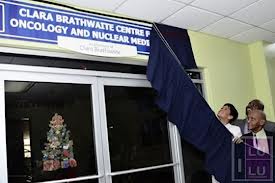THE radiotherapy department of the Queen Elizabeth Hospital (QEH) will soon be in a position to provide radiation therapy from the inside, getting closer to the areas affected by cancer.
According to David Callendar, Director of Medical Services at the QEH, the acquisition of a new brachytherapy machine – when used in conjunction with the new external beam radiotherapy system – will also assist in the treatment of gynaecological cancers and reduce the need for major surgery to be performed in such cases. Moreover, he revealed that in an effort to reduce hospital stay, the administration of the hospital is spearheading a programme to offer laparoscopic gynaecological surgery on a larger scale, so that even if surgery is required in some cases, small incision techniques may be utilised, which would result in a speedier recovery for patients.
Speaking at the renaming ceremony of the department to ‘The Clara Brathwaite Centre for Oncology and Nuclear Medicine’ in honour of the late Clara Brathwaite, grandmother of Barbadian-born recording artist Rihanna – whose humanitarian charity, The Clara Lionel Foundation is providing the department with three new pieces of equipment valued at $3.5 million to aid in the treatment of cancer – Callendar said that the hospital will be in a much better position to offer timely and efficient delivery of treatment to patients.
Referring to the external beam radiotherapy system, the director of medical services explained that it would ensure that downtime will be significantly reduced.
“With its automated set-up and other features, the overall time spent in the treatment room will be reduced; hence more patients can be treated on a daily basis. The long-term goal is to eliminate any waiting list for treatment and this new machine will assist in achieving this goal,” he stressed.Turning his attention to the Gamma Camera which is also being provided for the hospital through the grant agreement with the Foundation, Callendar said that once up and running, the camera will allow in-house specialists to detect abnormalities earlier in the disease process. He explained that at present this service is being outsourced.
“…I am sure that our clinicians look forward to the day when we can again offer diagnostic scans, stage already existing cancer, evaluate response to treatment, detect cancer recurrence, and even evaluate the anatomy and function of some organ systems in the body, all with this equipment and the nuclear medicine service,” the medical services director stated.
He further indicated that with the soon-to-be established Medical Day Unit, they will be able to offer chemotherapy to patients in a quieter and more conducive environment. (JRT)














